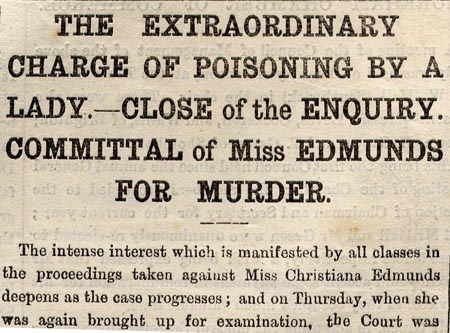Death by Chocolate

As Valentine’s Day approaches, we revisit an earlier story, as a member of the old Brighton History Centre team delved in to the darker side of love.
Our celebration of Valentine’s Day seems a harmless indulgence, but a glance at the history books reminds us that love can be a dark and destructive force.
Local papers describe in detail the case of Christiana Edmunds, convicted of murder in 1872. Her story shows how desire can lead to delusion, with fatal consequences.
Christiana was a respectable young woman who moved to Brighton in the 1860s. In 1869, she met and fell in love with Dr Charles Beard, a married man whose surgery on Grand Parade was not far from her home in Gloucester Place. Their romance is said to have lasted about a year, during which time they exchanged love letters, but in the summer of 1870, Dr Beard ended the affair.
Soon after, Christiana visited the doctor’s wife Emily, bringing a gift of chocolate creams. After eating one, Mrs Beard was sick and her husband, suspecting foul play, banished Christiana from their home. He said nothing to the police, however. People in the town continued to fall ill after eating sweets or chocolates, though none were seriously affected until four-year-old Sidney Barker died in June 1871. The chocolates he had been given were found to contain strychnine (a form of pesticide), but a verdict of accidental death was recorded.
Despite this tragedy, the poisonings continued. Prominent families were targeted and even Christiana herself claimed to have been a victim. The police had no leads and no way of reassuring the public, until Dr Beard told them of his suspicions. Christiana was arrested and charged, first with the attempted murder of Emily Beard and later with the murder of Sidney Barker.
The trial began in Brighton, where it caused a sensation, and was moved to the Old Bailey in January 1872. Witnesses came forward to testify that Christiana had sent children to buy chocolates from Maynard’s, a well-known confectioner in West Street; she then injected them with poison and returned them to the shop, claiming they were not what she required. Her goal was to kill Mrs Beard but, to divert attention from herself, she was obviously prepared to risk the lives of many others.
The Victorians were fascinated with tales of true crime and Christiana’s story contained all the key ingredients – criminality and passion, deceit and disguise, beneath a veneer of respectability. Dubbed ‘the chocolate cream poisoner’, she was found guilty of murder and, declared insane, was sent to Broadmoor, then a criminal lunatic asylum. Vain, coquettish and apparently showing no sign of remorse, she remained there until her death in 1907.